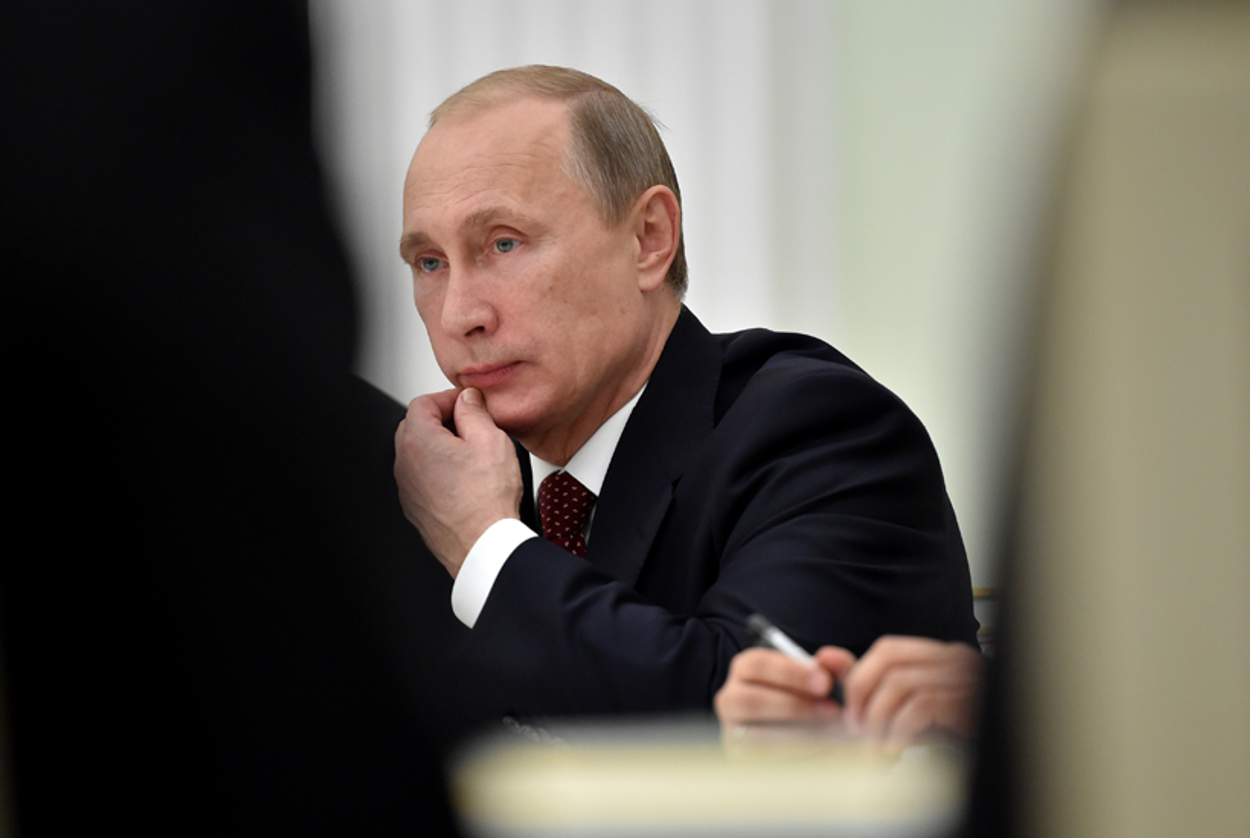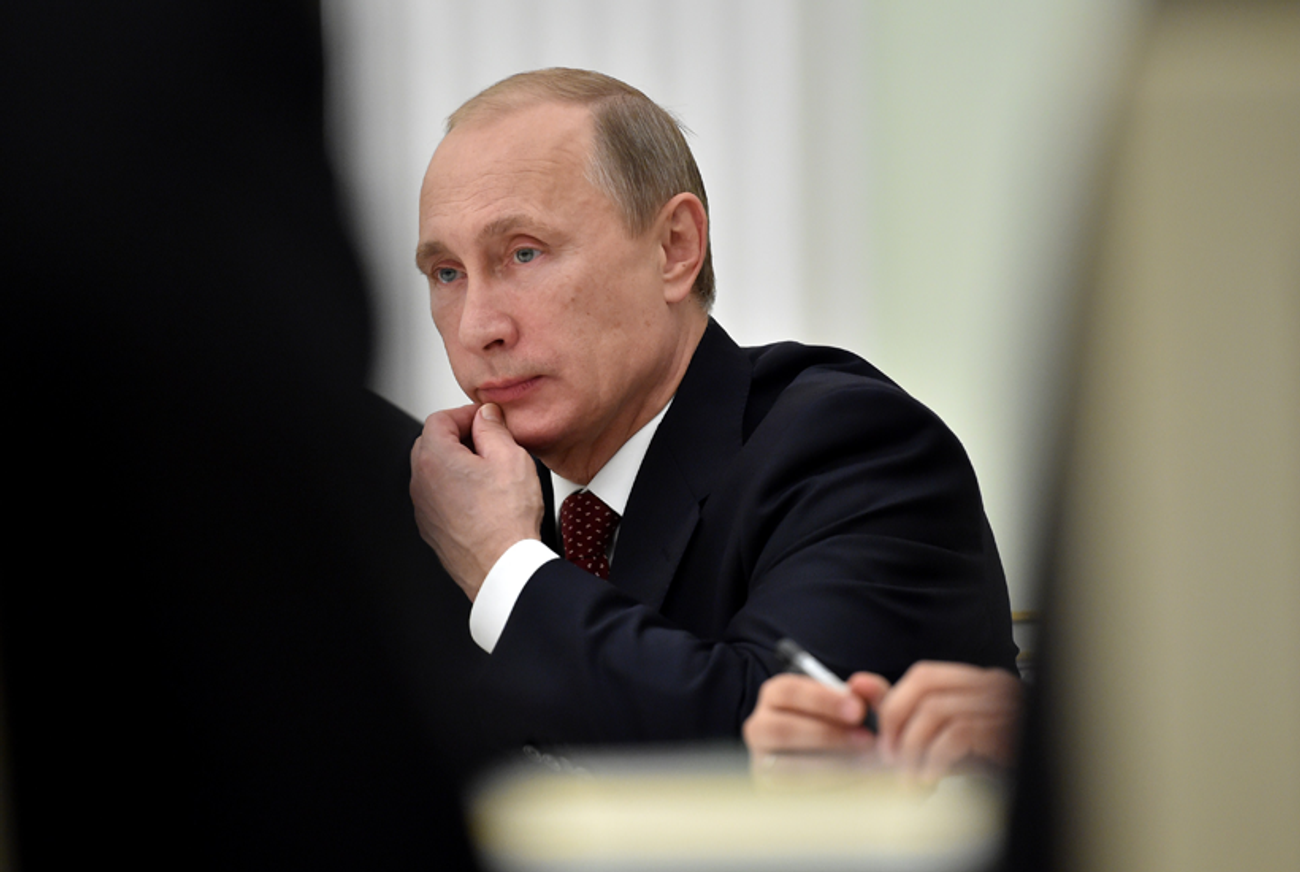Nothing Is True and Everything Is Possible in Putin’s Russia
The post-Soviet, postmodern illiberal kleptocracy as a harbinger and warning bell for—the West?




Peter Pomerantsev arrived in Moscow in 2001 with the idea that everything was possible in “a city living in fast-forward, changing so fast it breaks all sense of reality, where boys become billionaires in the blink of an eye”—a sense of speedy exuberance he conveys in colorful, punchy prose in his new book, Nothing Is True and Everything Is Possible. He worked at a think tank as a consultant and then began a career as an independent producer at TNT, an entertainment channel whose slogan is “Feel our Love.” But Pomerantsev began to notice that feel-good stories were hard to find, despite the rapid development of a middle class and its exuberant embrace of Western goods.
Yes, everything was possible, but because nothing was true. It was all “a glittering masquerade, where every role and any position or belief is mutable.” TV is key to a new, subtler authoritarianism by which Russia’s President—Putin is called by name only nine times in the book, presumably because Pomerantsev loathes him so much—controls this sprawling, wildly diverse country. Every year, the Kremlin becomes more paranoid, “the need to incite panic and fear ever more urgent; rationality was tuned out.” And so, Nothing Is True begins in exuberance but continues, as the author’s hope curdles, as an unsparing analysis of this new authoritarianism, where, as a famous TV presenter puts it, “politics has got to feel like a movie.”
Most of Nothing Is True previously appeared as articles in such outlets as the London Review of Books and The Interpreter, but the book mainly avoids the feeling of a cobbled-together collection because of its fractal nature. Each chapter, almost each page, repeats and deepens the message, and because Pomerantsev covers a broad swath of Russian life and writes so well, almost every page is quotable.
***
Take an early section that describes the subculture of Moscow’s gold diggers, leggy girls from the provinces whose job it is to grab a “Forbes” (as in the rich list). There are dozens of clubs to connect “Forbeses” with aspiring mistresses, dozens of $1,000-a-week courses for aspiring kept women. The advice they offer is probably spot-on (“Never wear jewelry on a first date, the man should think you’re poor”), some of it quasi-scientific (a woman should squeeze her vaginal muscles because it makes her pupils dilate, which makes her more attractive). What Pomerantsev finds beneath the sparkly surface is grim: Girls are called “tiolki,” or cattle, their marketability slips at 22, the millionaires they date speak of them with contempt. All the gold diggers Pomerantsev meets grew up fatherless. They are “looking for a daddy as much as a sugar daddy,” he realizes. Worse, “it’s the President who encapsulates that image.”
It may sound as though Pomerantsev is obsessed with Putin, but as he makes clear, it’s that wherever you go—in your mind or on TV—Putin is there. This is because of the outsized importance of the state, and how the state is identical with the person who runs it. More than half of Russians, he observes, are employed by the state, and obtaining a state position is viewed as a pathway to (illicit) riches. Muscovites try to build as close to Red Square as possible, due to “a still feudal social structure defined by needing to be within touching distance of the tsar.” Bands of citizens patrol their neighborhoods at night against arsonists, as property developers allied with the mayor of Moscow set fire to buildings to pave the way to seizing them as a fire hazard and then tearing them down in return for kickbacks from developers.
All the products, material and intellectual, that were kept out by the Berlin Wall are now freely available in Russia—but that hasn’t led to Russians acting like Westerners or choosing leaders who act like Western leaders. “This isn’t a country in transition but some sort of postmodern dictatorship that uses the language and institutions of democratic capitalism for authoritarian ends.” Pomerantsev writes. “The Kremlin’s vision of itself in the world,” he decides, “is as a ‘corporate raider,’ the ultraviolent cousin of Western corporate raiders.”
Zooming out a bit more, Pomerantev’s book is about the decoupling of the culture of advanced liberal democracy from its political institutions. It’s about how you can have avant-garde art, and rulers who appreciate avant-garde art, in a dictatorship. Rulers like Vladislav Surkov, who, more even than Putin, is the evil genius of this book. Surkov is a former deputy prime minister of Russia but is better understood as Putin’s chief ideologist: a former PR guru for oligarchs who is so postmodern that when asked by a reporter this spring how he feels about being put on the U.S. and E.U. sanctions lists for his role in the invasion of the Crimea, he replied, “The only things that interest me in the U.S. are Tupac Shakur, Allen Ginsberg, and Jackson Pollock. I don’t need a visa to access their work.”
How could someone who can recite Ginsberg by heart also start the Putinite youth group Nashi and organize the annexation of the Crimea? As easily, it seems, as concentration-camp guards listened to Beethoven. Indeed, Surkov is rumored to be the author of a brilliant, subversive, pseudonymous novel titled Almost Zero. It is a satire of corruption in Russia, set in the worlds of PR and publishing. Pomerantsev writes:
If the West once undermined and helped to ultimately defeat the USSR by uniting free market economics, cool culture, and democratic politics into one package, Surkov’s genius has been to tear these associations apart, to marry authoritarianism and modern art, to use the language of rights and representation to validate tyranny, to recut and paste democratic capitalism until it means the reverse of its original purpose.
Pomerantsev doesn’t extend his analysis in this direction, but we ought to worry whether the decoupling he describes could happen here too. It may be hard to imagine a Surkov in the United States, because the extreme contradictions he encompasses don’t need to be encompassed by anyone living in a liberal democracy. But it’s not hard to imagine hipster music or art or TV being used to market illiberal ideas, bigotry, or fanaticism, in the hands of the right skilled operator.
Even a “free press” can become an instrument of oppression in this clever new world. Pomerantsev’s frightening tale of the false arrest, imprisonment, and eventual release of a mid-level chemicals importer on the ridiculous charge that the dry cleaning chemical she sold was a narcotic, illustrates how the lives of innocent “little people” can be destroyed if they find themselves in a war between Kremlin factions. Pomerantsev describes the media campaign for the importer’s release and explains, “This was one of the reasons ‘liberal’ papers and channels existed, to give one power broker a weapon to hit another power broker with.”
Like the truly good book it is, Nothing Is True is related to any number of important conversations that have nothing to do with Russia. In some ways, it appears to be in a dialogue with The Peripheral, the brilliant but not fully realized new novel by William Gibson. The Peripheral describes a future nominal democracy run by a class simply called “klept,” a rich society using robot technology to do most of its dirty work, and a society that takes high art seriously, in which parts of London have been re-forested, but such a sad and corrupt place that some of its citizens are trying to penetrate the past to prevent this particular outcome from coming to be.
Russia “became post-Soviet a breath before the whole world went post-everything.”
The “postmodern dictatorship” concept also applies to other parts of the world in which we live now: maybe to a critical mass of the people now alive. To China, as Melik Kaylan and Douglas Schoen have argued in their The Russia-China Axis. There are many nations where the Russian and Chinese models appeal. These are, according to Kaylan and Schoen, “countries insecure in their statehood and threatened by contradictory pressures from within and without, and we are asking them to take on board our postmodern notions of diversity when they are wrestling with total fragmentation, if not dissolution. These countries are not accustomed to democracy. They are afraid, or have become afraid, of liberation without order.” Or think about Erdogan’s Turkey.
Nothing Is True is so fun to read, so sparkling and colorful, that it’s a while before it hits you that Pomerantsev is throwing daggers not just at Putin, but at the West. (In both style and moral fervor, Pomerantsev is reminiscent of classic period Tom Wolfe.) Recently, Pomerantsev says, Russian dissidents have taken to invoking “London” and “the West” not as aspirations but “with a light disgust, as the place that shelters and rewards and reinforces the very forces that oppress them.”
This “light disgust” seems to be Pomerantsev’s own. Pomerantsev has a dog in this race: He was born in Kiev to Russian dissidents who fled to England. He sees Russia not so much as a black comedy but as a morality play: “Russia is the place where … the choice between good and evil becomes distilled. Is this what makes it so addictive?” Sometimes, he says, it is easier to choose evil, with the justification being that “there is no West anymore.” For the Russians, at least, this is true. They are the trendsetters in the world of “sudden global money” because they’ve been at it a bit longer, and they’ve been deracinated, cut loose from their moorings, a little longer; “they became post-Soviet a breath before the whole world went post-everything.” Once upon a time, new foreign money came to England to learn how to fit into English society. But “why bother when the richest people in the city have non-English names now anyway?” Whether you’re Russian or Arab, you send your kids to an English boarding school and buy a flat in Mayfair because it’s a status symbol, not because you want to pass as English, or assimilate English values. “The West” is just a place to shop and dine.
Pomerantsev doesn’t go down this path, but it’s implied in his book that we in the West have made it increasingly easy for people from developing countries to think this way, with our cool moral relativism, our anxiety to be politically correct, our lack of pride in our culture’s achievements. Sophisticates who abhor vulgar consumerism nonetheless aid and abet “klept” by failing to insist that the West is rich because of its good values. What is the West? What does it stand for? Is there anything wrong with laundering money in the morning and reading Allen Ginsberg at night? These questions sound old-fashioned and oddly earnest today. Pomerantsev may be able to raise these issues so naturally because he was born in the Soviet world, but his book suggests that we had all better develop ears for what he is trying to tell us. Nothing Is True is a brilliant, entertaining, and ultimately tragic book about not only Russia, but the West.
***
Like this article? Sign up for our Daily Digest to get Tablet Magazine’s new content in your inbox each morning.
Ann Marlowe, a visiting fellow at the Hudson Institute, is a writer and financial investigator in New York. She is the author of How to Stop Time. Her Twitter feed is at @annmarlowe.
Ann Marlowe, a visiting fellow at the Hudson Institute, is a writer and financial investigator in New York. She is the author of How to Stop Time. Her Twitter feed is at @annmarlowe.